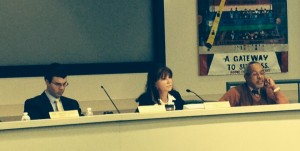By Mark Hansel
NKyTribune Contributor
Discussion of the need for effective legislation to combat the region’s heroin epidemic and the use of tolls to help fund the Brent Spence Bridge replacement dominated Saturday’s Northern Kentucky Caucus 2015 Legislative Forum.
State Rep. Addia Wuchner, R-Florence, chaired the public forum, which also included 11 other Northern Kentucky legislators.
An estimated 150 elected officials, business owners and members of the general public attended the meeting, which took place on the campus of Florence Elementary School.
The message to legislators regarding the growing heroin epidemic was clear. A repeat of last year’s session, during which haggling over the components of a bill resulted in a failed attempt to push through 11th-hour legislation, is unacceptable.
Charlotte Wethington, of Transitions, Inc. encouraged the panel to put the needs of the community ahead of political partisanship.
“We have the opportunity to pass, some very impactful legislation,” Wethington said. “We know there are things we can do to address this epidemic. Please, I would implore you not to let politics get in the way of passing some significant life-saving legislation.”
Wethington’s son, who died of an overdose in 2002, was the inspiration for “Casey’s Law.”
The Matthew Casey Wethington Act for Substance Abuse Intervention, adopted in 2004, provides a means of intervening with someone who is unable to recognize the need for treatment due to their impairment.
Wuchner said there is a sense of determination among legislators that something must be done during this session.
“Having a meaning piece of legislation would be about the heroin network that is killing our young people and destroying lives and really taking away the future of this region and our state,” Wuchner said. “If we do not see that through, we can’t come home, because we have the responsibility to be tough on crime and see what other avenues need to be present in this bill.”
In January, Senate Bill 5, which includes increased penalties for traffickers and million of dollars for treatment received bipartisan support and was sent on to the House. Rep. Diane St.Onge, R-Lakeside Park, said an omnibus bill that is being put forth will take into consideration all of the proposed legislation being considered.
“While I have always learned not to guarantee anything, I will tell you that we will come forward with a heroin bill this year,” St.Onge said. “I feel very strongly that everyone is committed to passing a heroin bill.”
Discussion of the Brent Spence Bridge replacement focused on everything from questions about the cost of a new bridge, estimated at $2.5 billion, to the impact tolls would have in Northern Kentucky.
While some view a public private partnership (P3) than includes tolls, as the preferred option to finance the bridge replacement, that opinion was not shared by many in attendance Saturday.
Covington City Commissioner Chuck Eilerman was among those who spoke out against tolls.
“The impact of this project, even without tolls, is enormous, particularly on Covington and we are taking one for the team here,” Eilerman said. “One study has shown that even with low tolls there will be a doubling of traffic on the Clay Wade Bailey and the Roebling Bridge. We are trying to be more pedestrian friendly and bike friendly and we don’t need to double our traffic on the (other) bridges.”
Covington Mayor Sherry Carran, however, said the ability to obtain funding for a new bridge is paramount.
“If it takes tolls to get the bridge built, then I will support tolls,” Carran said.
Trey Grayson, president of the Northern Kentucky Chamber of Commerce said P3 is a way to better utilize private sector experience on public infrastructure projects.
“We’ve got to be smarter with how we invest our tax dollars,” Grayson said. “P3 is a great tool utilized by 34 other states, not just in transportation, but in water, sewer and so many other projects and we need that tool in our toolbox.”
Other topics of discussion included Common Core standards for education, Right to work legislation and proposed statewide restrictions on smoking in public places.
Discussion on the proposed smoking legislation (House Bill 145) mirrored that of the Northern Kentucky ban proposed in 2010.
Supporters, including Dr. Lynne Saddler, district director of health for the Northern Kentucky Health Department, pointed to the health risks associated with smoking and second-hand smoke.
“The evidence is pretty darn clear that smoking is very harmful to the health of people in Kentucky,” Sadler said. Kentucky spends almost $2 billion a year in health-care costs treating smoking-related illnesses.”
Those opposed to the legislation say it is a property rights issue that infringes on the ability of individual business owners to operate as they choose.
Each year Northern Kentucky lawmakers conduct the public forum to solicit input from constituents on legislative issues and community concerns.
Legislators in attendance:
Rep. Addia Wuchner, 66th District, Chair
Sen. Wil Schroder, 24th District, Vice-Chair
Senators: John Schickel, 11th District; Damon Thayer, 17th District; Chris McDaniel, 23rd District.
Representatives: Sal Santoro, 60th District; Ryan Quarles, 62nd District; Diane St. Onge, 63rd District; Thomas R. Kerr, 64th District; Arnold Simpson, 65th District; Joseph Fischer, 68th District; Adam Koenig, 69th District.

















